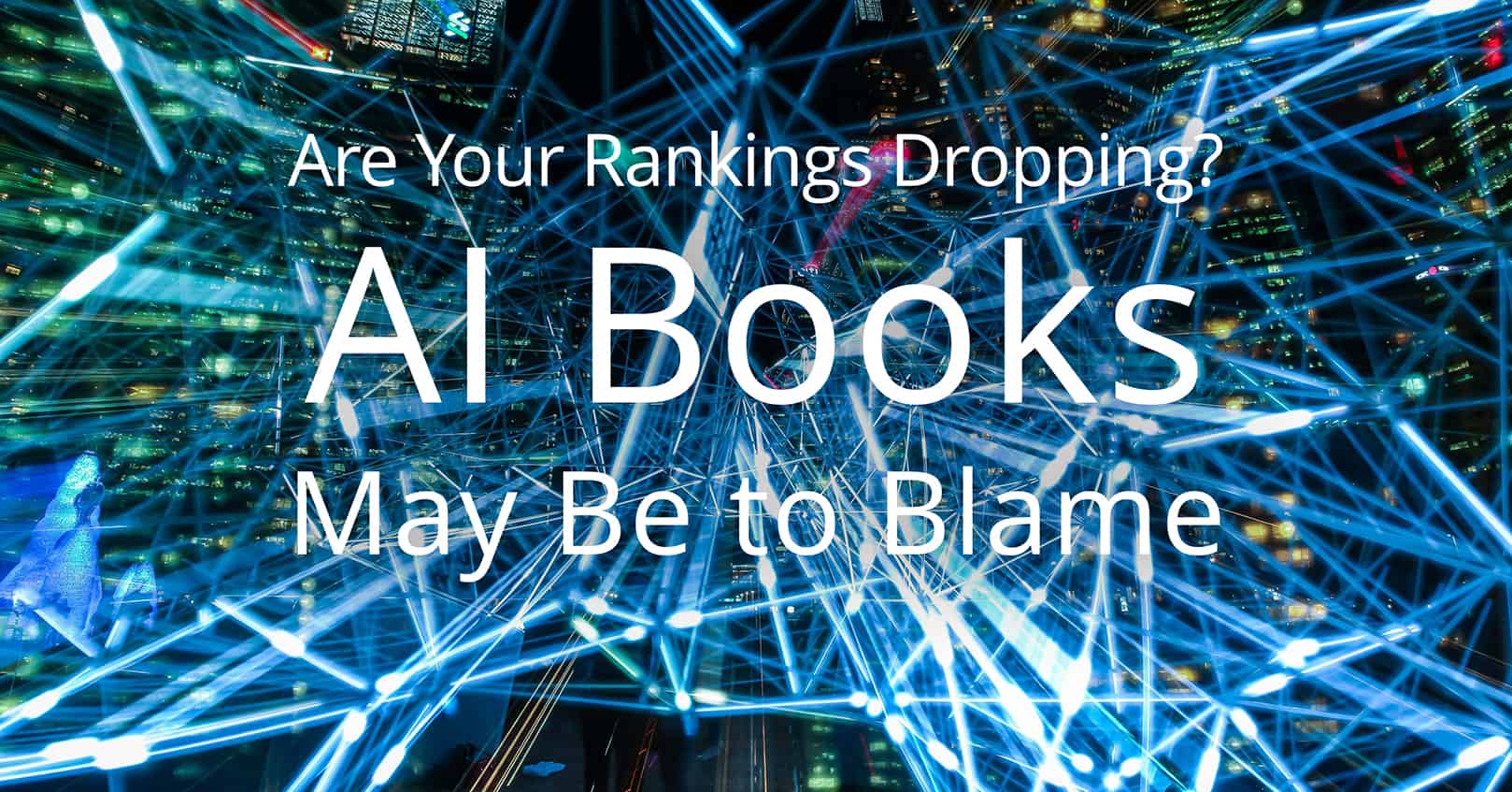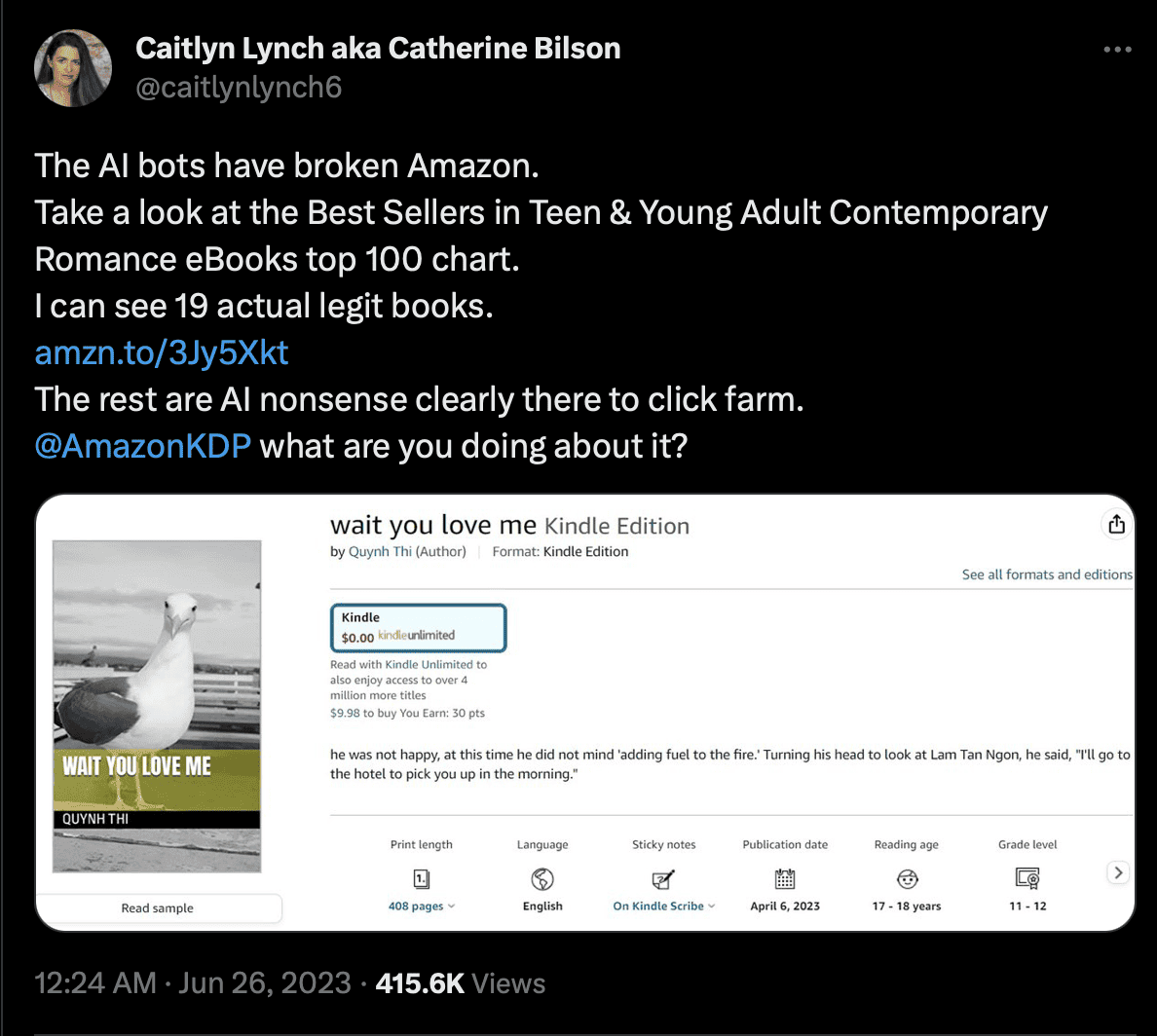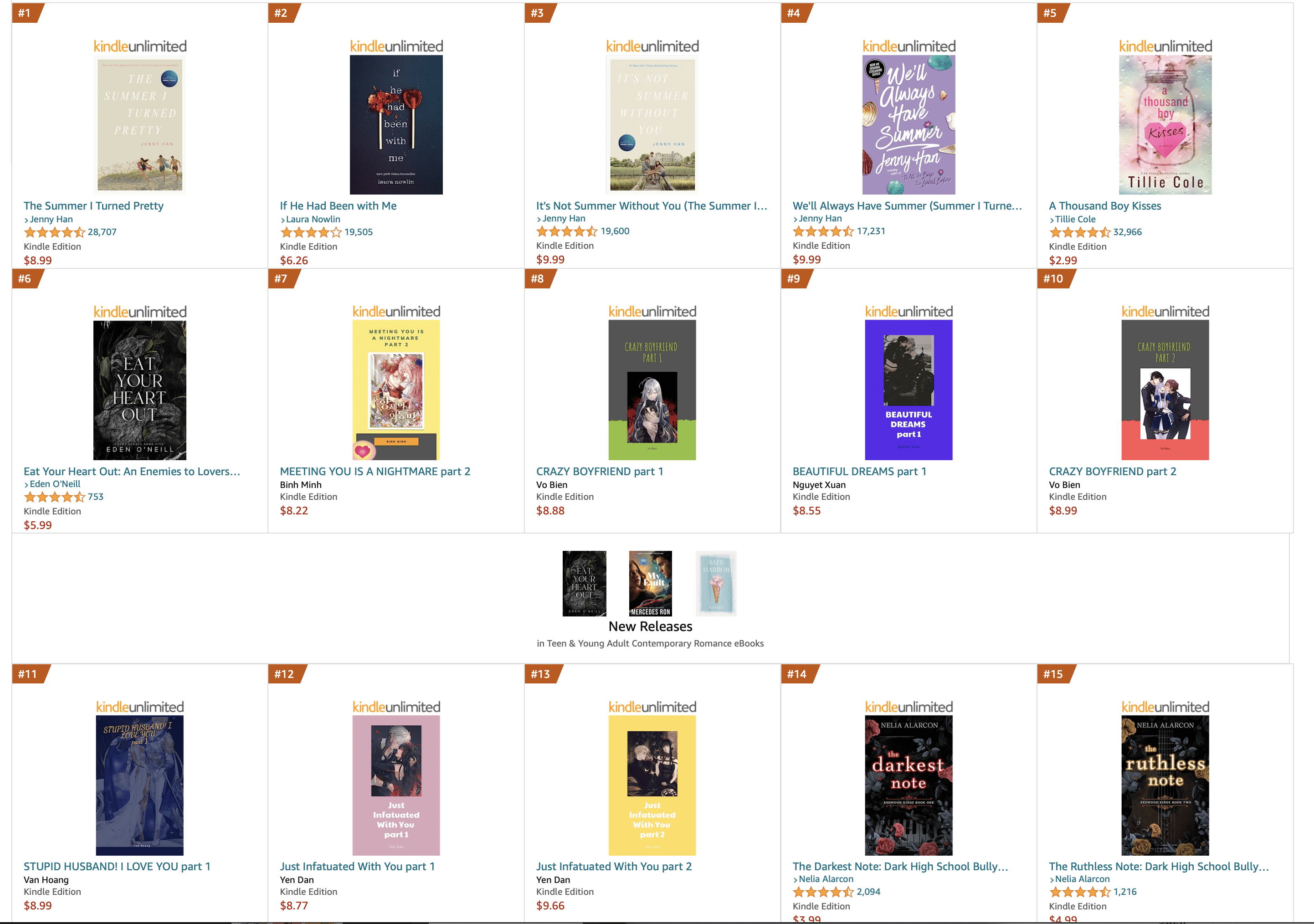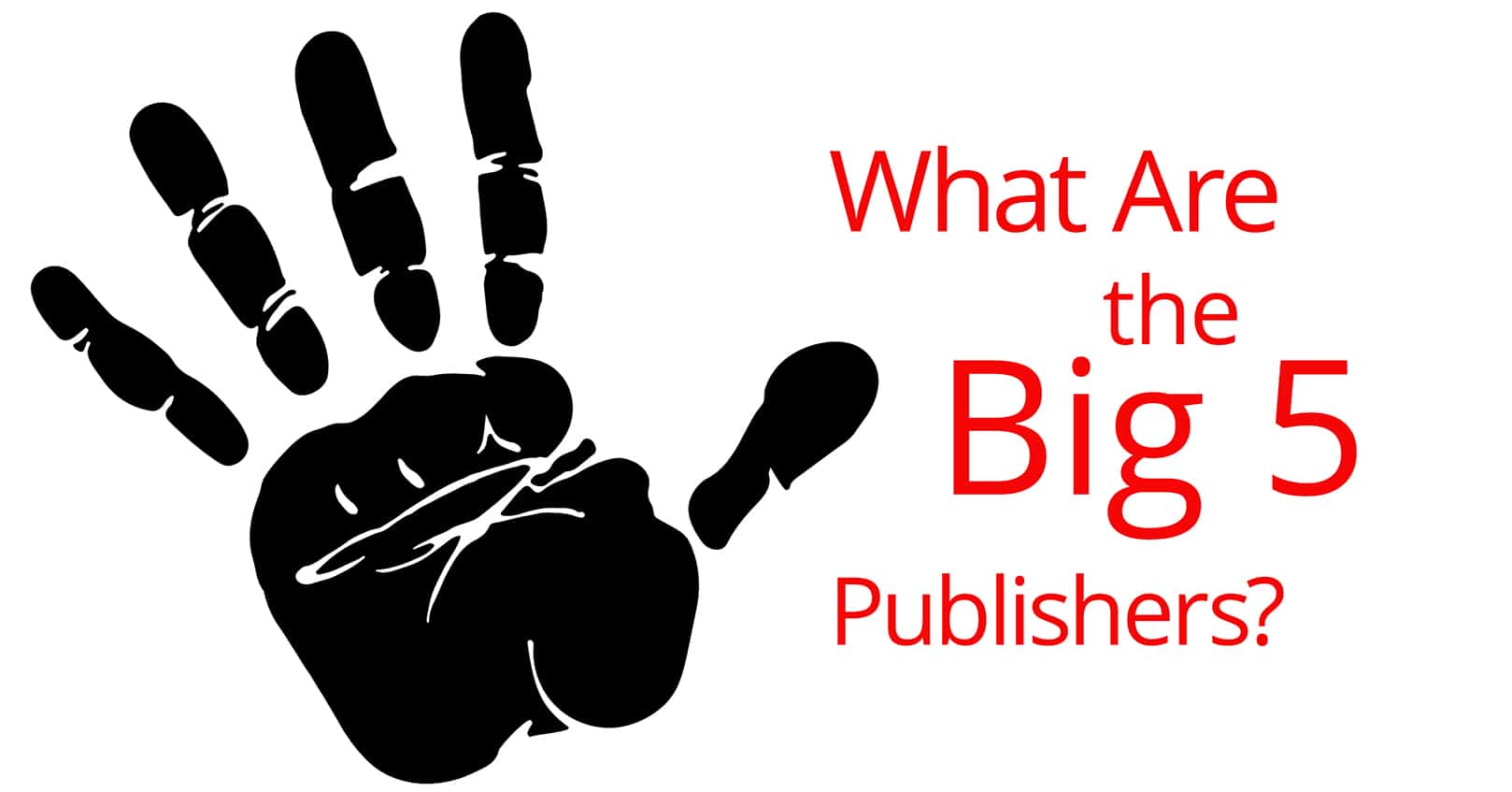
Lately, it seems that Amazon is losing its handle on bot farming and authors are taking notice.
Caitlyn Lynch aka Catherine Bilson recently posted this:

Now, I thought this must be an exaggeration. Surely a giant like Amazon would have security methods and ways of eliminating these fake AI books and the bots that read them. So I decided to take a look at the link myself, and this is what I saw:
Can you spot the fakes? I think it’s pretty easy to tell when an alleged “bestseller” that has crazy cheap or autogenerated cover designs and gibberish descriptions and text, has managed to become a bestseller with literally 0 reviews on a list where others have 20k reviews. Here’s the link she references and that I visited if you’re curious. I hope that someday this link no longer shows such bogus book rankings, and maybe by the time this blog is actually published, this link might already be cleaned up from all the attention it’s garnered. But in the meantime . . .
Okay, let me take a step back for those of you who aren’t sure what’s going on here. Essentially, with the accessibility of AI on the rise, anyone can quickly generate a “book” and list it on Amazon. Other methods of fake book creations that I’ve seen mentioned are translating korean dramas (or other language texts) into English by quickly plugging them through a translator tool or by uploading modified or translated fanfictions. Of course, that alone wouldn’t be enough to skew the Amazon rankings. That’s why these same fraudsters also send thousands of bots to “read” these books. Amazon KU, as you know, pays per the number of pages read, so it’s quite easy for these individuals to quickly generate a significant amount of money through these methods. Some people estimate that these bots could easily read enough to generate a hundred dollars a month each. Even if you subtract their KU fee, it’s easy to see how thousands of bots all making a little bit of money for the scammer each month would be worth it.
Now, all of a sudden, the real books you’ve worked so hard writing and promoting are being out-maneuvered by these fake AI books and their bot readers, through no fault of your own. So if you’ve noticed a significant drop in your book rankings and sales these past few months, this could definitely be a factor. It is unclear how wide of an issue this really is, but it sounds like authors are seeing this across a variety of different genres and that these fake AI books have even found their way into the auto-generated “recommendation” emails that Amazon sends out.
The big question on everyone’s mind is, how long will it take for Amazon to deal with a problem that’s so apparent to everyone else? Hopefully, it’s quick, but it may be a complex enough issue that it never fully goes away. As Amazon does attempt to crack down, these cheaters may continue getting smarter and this may end up being an ongoing problem. This is alarming because it has several very real repercussions for authors. Including:
- Decreased visibility for real books. The harder your real books are to find, the fewer readers will find you and the less your books will be read.
- KU payouts could decrease. If bots are reading books in unsustainable amounts for KU to pay authors, payments across the board will decrease. They’ve already raised KU subscription prices for readers. The next step could be decreasing the payout for authors. You could be having books read less as well as being paid less for what is being read.
- KU could lose it’s reputation. If the problem remains ongoing, KU as we know it could be forever altered. We know many of our Authors rely on KU for a significant part of their income. If this bot farming continues to go on, more and more authors will pull their books, which may lead more and more readers to cancel their subscriptions, and KU as we know it could end and become a shadow of its formal self.
The number of these fake books is much bigger than we see here. These books that were greedy enough to rank this high will probably be caught and taken down sooner rather than later, but these are just the tip of the iceberg. There are thousands more hiding further down in the rankings and drawing less attention to themselves that probably won’t be caught for a long time. Some may have even put a little more effort into their covers and descriptions in an effort to appear more legit.
So what can you do?
Not too much, unfortunately. However, you can report the fake AI books you spot to Amazon to help get them taken down more quickly. If many people are reporting the same books, hopefully Amazon will do something about them. Some of the books we’ve found have been listed for many months without anyone noticing.
How can you tell which books are AI books that should be reported? Unfortunately, it won’t always be easy. While many of the examples here are really bad and obvious, these frauds will get smarter when and if Amazon cracks down. It’s not always easy to spot a fake, but looking for nonsense titles, poor covers, and word-soup text are all pretty big giveaways. Researching the author and novel off of Amazon can also be helpful. A well-ranking book and author should have an internet presence beyond Amazon. If they don’t, that’s a huge red flag.
I’d encourage you to visit this thread for yourself to learn more about this issue, to see examples of how much these frauds are making from their fake books, as well as other examples of ways these AI books are infiltrating rankings.
The AI bots have broken Amazon.
Take a look at the Best Sellers in Teen & Young Adult Contemporary Romance eBooks top 100 chart.
I can see 19 actual legit books.https://t.co/fy9rtV6Ck6
The rest are AI nonsense clearly there to click farm.@AmazonKDP what are you doing about it? pic.twitter.com/cziuKcQrq3
— Caitlyn Lynch aka Catherine Bilson (@caitlynlynch6) June 26, 2023
Have you noticed a drop in your rankings lately? Or spotted more examples of AI bots infiltrating Amazon? Share with us in the comments below.
Happy writing.
















Comments